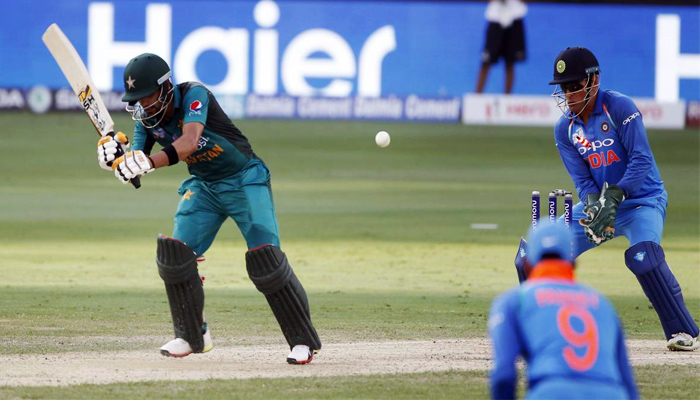Now even cricket is getting caught up in the Indo-Pakistani conflict over Kashmir
Opinion by Hamid Mir
Hamid Mir is a Pakistani journalist and author.
The fight over Kashmir is one of the world’s most dangerous conflicts. India and Pakistan have fought three wars over the territory since 1947. India and China also fought a war in the same region. That is why Kashmir is widely regarded as a potential nuclear flashpoint. The people of Jammu and Kashmir are the biggest victims of the rivalry among three nuclear powers. Now the latest casualty of this rivalry is the sport of cricket.
Cricket is the second most popular sport in the world. Like baseball, it involves two teams, a bat, a large field and scoring runs. But now this game has become a hostage of the geopolitical competition between India and Pakistan. The Board of Control for Cricket in India (BCCI) is apparently trying to prevent some South African and English cricketers from playing in a league organized in Pakistani-administered Kashmir.
South African cricketer Herschelle Gibbs revealed last week in a tweet that the BCCI is trying to prevent him from playing in the Kashmir Premier League, threatening, among other things, that they won’t allow entry into India. The Pakistan Cricket Board has condemned the BCCI. India has not played international cricket with Pakistan for many years, of course. But why is the Indian government trying to stop international cricketers from playing in the Kashmir Premier League?
India and Pakistan each control their own parts of the divided region; both territories are controlled by the countries’ respective militaries. (One part of this region, Aksai Chin, is controlled by China.) Cricket, it so happens, is the most popular game in both parts of the region.
India fears that Pakistan is playing politics by organizing an international cricket event in the part of the disputed territory under Islamabad’s control. The Kashmir Premier League is scheduled to start on Aug. 6 — one day after the second anniversary of India’s move to strip Kashmir of its special constitutional status. Delhi not only deprived the territory of its autonomy but also overturned provisions that prevented Kashmir from allowing land purchases by non-Kashmiris. Pakistan and China both rejected the Indian government’s decision. Last year, Delhi also imposed a curfew in the region to forestall protests ahead of Aug. 5.
The Indian army itself has sponsored some cricket events in the past, including inviting cricket stars to visit troops in Kashmir. The Indian government is using cricket for political purposes because the game is popular even among the pro-freedom militants. Kashmiris often organize cricket matches to pay tributes to slain militants.
Instead of using cricket for the promotion of peace, India and Pakistan have turned it into a tool of hateful nationalism. The two countries announced a cease-fire early this year on the Line of Control that divides this mountain region, but they have so far failed to reach an understanding over a cricket league. Both countries claim that Kashmir is an integral part of their countries, but both have denied basic human rights to Kashmiris.
The 2021 Freedom House report classifies both the Indian- and Pakistani-controlled parts of Kashmir as “not free.” India claims to be the biggest democracy in the world, but its actions in Kashmir contradict that assertion. Indian-administered Kashmir has been devoid of an elected assembly since 2018, and now the territory has lost its representation in the upper house of the Indian parliament as well.
Elections to the regional parliament were held in Pakistani Kashmir recently, but opposition parties claimed widespread fraud. Pakistani Prime Minister Imran Khan claimed to offer Kashmiris full freedom to decide the region’s status last month during the election campaign in Pakistani Kashmir, but he doesn’t seem bothered by growing human rights violations in the region. Last week, some in the region protested the killing of locals by Pakistani security forces. This news was blacked out on Pakistani media. Essentially, there is no transparent democracy in both parts of Kashmir, where international human rights bodies have documented human rights violations again and again.
India and Pakistan must realize that denial of human rights and the exploitation of cricket for political reasons would only spread extremism, which is already ringing alarm bells in the whole region. According to a recent report from the U.S. government’s National Intelligence Council, India and Pakistan might stumble into a large-scale war in the next five years. A self-radicalized lone suicide bomber from Pulwama caused a standoff between India and Pakistan in 2019.
Evidently, the Indian government is not doing enough to keep educated youths from joining Kashmiri militants. One more suicide attack against Indian security forces could create fresh crises between the two countries. India engaged Pakistan in secret talks a few months back but is reluctant to start open talks. Former Chief Minister of Indian Kashmir Mehbooba Mufti makes the pertinent point that, if India can talk to the Taliban, why not Pakistan?
If India cannot start a formal dialogue, it should at least allow its teams to take part in cricket matches with their Pakistani counterparts to defuse tension. If an India-Pakistan cricket series proves unfeasible in the near future, then Delhi should at least allow cricket fans from the Indian side of Kashmir to come and attend matches of the Kashmir Premier League on the other side. If even that isn’t possible, then, at the very least, neither government should prevent international cricketers from playing in the Kashmir Premier League. Hate cannot drive out hate. Only love can do that. Kashmiris need a break.

